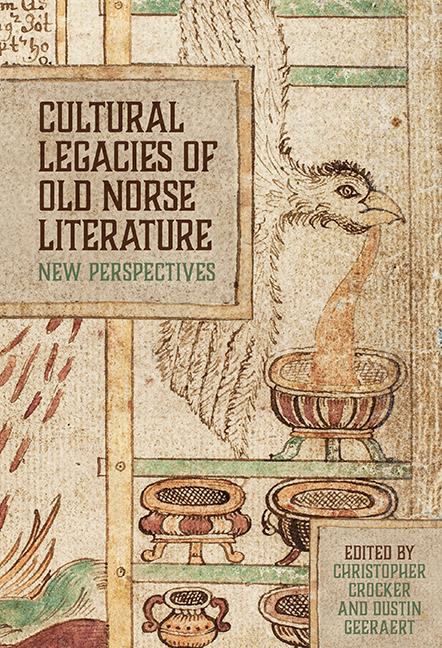Book contents
- Frontmatter
- Contents
- List of Illustrations
- List of Contributors
- Foreword: Old Norse and the Porous Boundaries of Medievalism
- Acknowledgements
- Note on the Text
- Introduction
- 1 Dr Jekyll and Mr Hyde in Medieval Iceland: Saga Realism and the Sworn Brothers
- 2 The Malleability of the Past: Íslendingabók as Narrative History
- 3 Women’s Work and Material Culture in Medieval Iceland: Gender, Narrative, and Cloth Production
- 4 Vafþrúðnismál, from Parchment to Print: Stability and Change in the Transmission of Eddic Poetry
- 5 The Odinic Motif: The Wanderer in the Mist
- 6 What has Darwin to do with Óðinn? Shapeshifting, God, and Nature in the ‘Great Story of the North’
- 7 Madness, Mythology, and Mitteleuropa: Günter Grass’s Transformation of Old Norse Myth in The Tin Drum
- 8 Once More, with Fiction: Transforming Myth in Gerður Kristný’s Blóðhófnir and the Eddic Poem Skírnismál
- Afterword: Ethnographic Medievalisms
- Bibliography
- Index
6 - What has Darwin to do with Óðinn? Shapeshifting, God, and Nature in the ‘Great Story of the North’
Published online by Cambridge University Press: 08 October 2022
- Frontmatter
- Contents
- List of Illustrations
- List of Contributors
- Foreword: Old Norse and the Porous Boundaries of Medievalism
- Acknowledgements
- Note on the Text
- Introduction
- 1 Dr Jekyll and Mr Hyde in Medieval Iceland: Saga Realism and the Sworn Brothers
- 2 The Malleability of the Past: Íslendingabók as Narrative History
- 3 Women’s Work and Material Culture in Medieval Iceland: Gender, Narrative, and Cloth Production
- 4 Vafþrúðnismál, from Parchment to Print: Stability and Change in the Transmission of Eddic Poetry
- 5 The Odinic Motif: The Wanderer in the Mist
- 6 What has Darwin to do with Óðinn? Shapeshifting, God, and Nature in the ‘Great Story of the North’
- 7 Madness, Mythology, and Mitteleuropa: Günter Grass’s Transformation of Old Norse Myth in The Tin Drum
- 8 Once More, with Fiction: Transforming Myth in Gerður Kristný’s Blóðhófnir and the Eddic Poem Skírnismál
- Afterword: Ethnographic Medievalisms
- Bibliography
- Index
Summary
Had he lived in the eighth century rather than the twentieth, J.R.R. Tolkien would have made an excellent apologist for the monks at Lindisfarne. Apparently too fond of the ancient Germanic songs, the monks received an impassioned letter from Alcuin, their Anglo-Saxon brother then working in the court of Charlemagne: ‘Quid Hinieldus cum Christo?’ Alcuin demanded. ‘What has Ingeld to do with Christ?’
This is the Great Story of the North, which should be to all our race what the Tale of Troy was to the Greeks.
William Morris and Eiríkur Magnússon, The Story of the Volsungs (1870)Anthony Ugolnik begins ‘Wordhoard Onleac: The medieval sources of J.R.R. Tolkien's Linguistic Aesthetic’ (1977) by noting that Tolkien nevertheless had plenty of ‘contemporary Alcuins’ to respond to. These were guardians of respectable orthodoxy who denied the importance of medieval literature, much less medievalism, in the modern age. In John D. Rosenberg's terms, while composing the Idylls of the King (1859–85) even Lord Tennyson was ‘urged not to write about knights in armor but to compose an epic on Work or Sanitation’. Yet literary works which respond to medieval ones always track their own time through anachronisms; and in the Idylls Tennyson demonstrates as much awareness of contemporary intellectual developments as elsewhere. Even Tennyson's self-doubt as to the relevance of ancient forms is presented in a manner indicating awareness of contemporary palaeontology: ‘For nature brings not back the mastodon’. Indeed, like philology, palaeontology pre-serves and examines what is ancient far beyond the local concerns of any upstart orthodoxy.
Gradually synthesizing enormous amounts of evidence, Charles Darwin knew that his society would find the discovery of evolution by natural selection to be shocking and threatening. Paradigm shifts in science, particularly those with implications for human nature, create ‘shockwaves’ to which writers adapt – particularly those who, like medievalists, implicitly compare past and present. As Peter Morton observes, few scientific discoveries have been more intellectually revolutionary than natural selection. Gillian Beer notes that despite his reluctance, Darwin's On the Origin of Species (1859) created a philosophical upheaval: ‘Everyone found themselves living in a Darwinian world in which old assumptions had ceased to be assumptions, could be at best beliefs, or myths, or, at worst, detritus of the past’.
- Type
- Chapter
- Information
- Cultural Legacies of Old Norse LiteratureNew Perspectives, pp. 113 - 140Publisher: Boydell & BrewerPrint publication year: 2022



